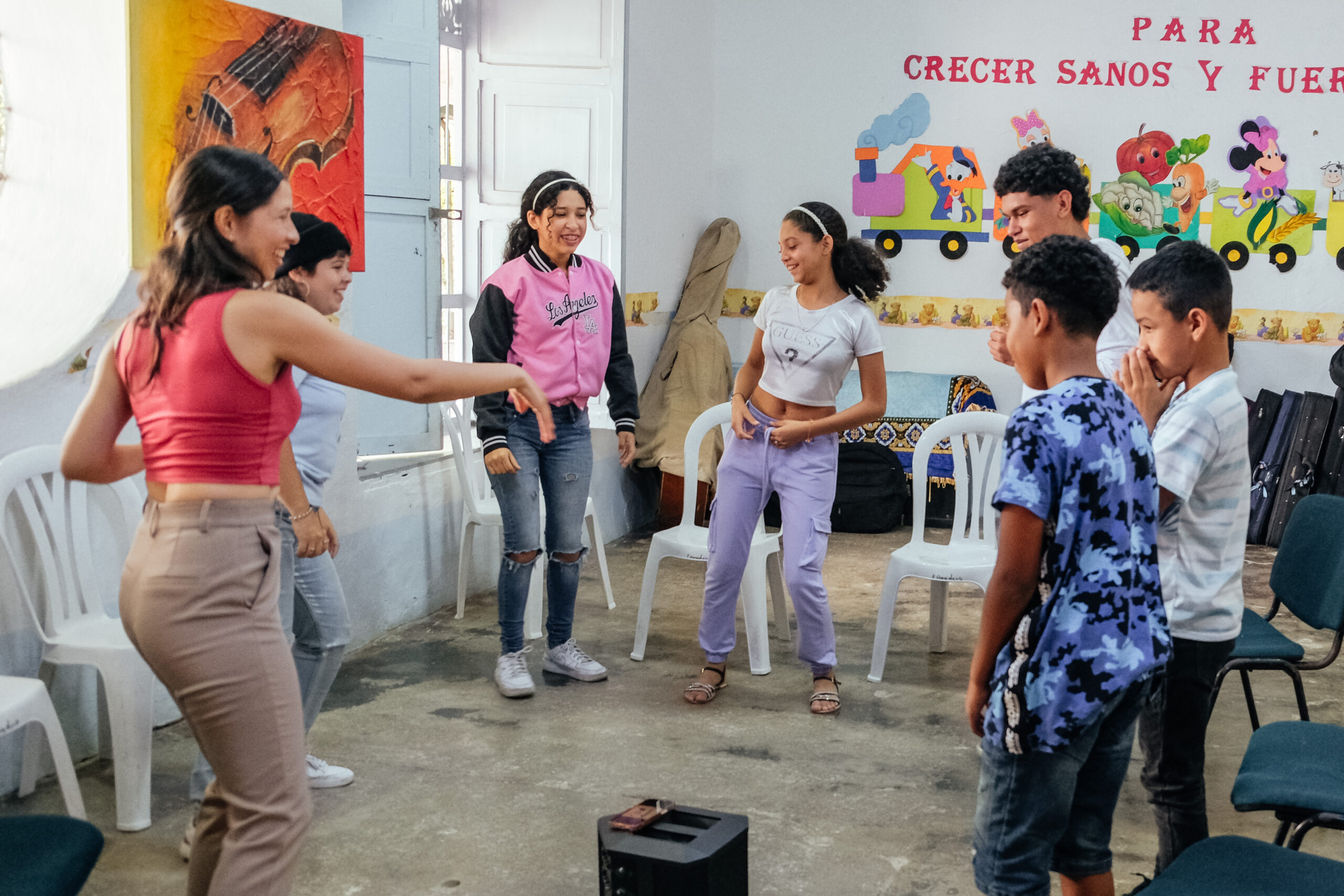Cultivando el bienestar - cultivating youth wellbeing
A transformative program building mental health skills with young people through music and creativity in Colombia
Cultivando el bienestar - cultivating youth wellbeing
A transformative program building mental health skills with young people through music and creativity in Colombia
Young people in marginalized communities in Colombia face numerous stressors and hardships. The presence of gang activity, violence, and financial instability make it difficult for youth to lead lives that reflect their potential. Together with teachers and community guides at Amadeus, we’re integrating music, artistic expression and mental health to support young people in Medellín and Bello. Our collaboratively designed program offers a yearlong opportunity to build psychological flexibility through guided activities, storytelling, and conversation.
What is the community’s story?
In Bello, a municipality outside Medellín, Amadeus offers transformative music programs aimed at fostering emotional intelligence and well-being among adolescents facing challenging environments. Many of these young people have experienced trauma and developed self-protective, often aggressive behaviors as a response. Amadeus works to shift these patterns by providing structured, supportive relational experiences. Teachers model compassion, empathy, and discipline, creating an environment where students can explore new, positive ways of interacting. Through mentorship and emotional skill-building, Amadeus helps break the cycles of violence and fosters a culture of kindness, generosity, and solidarity. This safe space allows young people to practice peace-promoting behaviors, offering an alternative to the aggression they may encounter in their communities.
Providing a structured environment as a refuge from the ways of the streets is a starting point for young people to practice peacefully relating with themselves and each other. Yet these behaviors do not stay within the refuge; they extend back into the community, as participants begin to relate with friends and family members in newfound ways. As their numbers grow, they offer glimpses of possibility to their peers—demonstrating that interpersonal peace is achievable, even in contexts fraught with violence.




What is our partnership about?
We were thrilled to launch our partnership with Amadeus in early 2023 to support the mental health and wellbeing of young people age 11 to 17. After a year of diving deep into understanding the context, participants, and leaders, we have co-created a youth mental health skill-building program that fits our partners’ mission and hopes for impact. These programs include stories, illustrative activities (utilizing art and music), and reflective conversations to promote psychological flexibility for navigating the ongoing challenges of being a young person in Colombia today.
In February 2024, we began a pilot of this program in several music schools with 5 teachers and 90+ youth, with a vision of creating a new model for engaging young people through the arts to promote mental health. The program integrates directly into Amadeus’ ongoing activities, including their extraordinary youth orchestra and instrument building (lutherie) workshops. Over the course of the year, young people participate in experiential learning of different psychological skills, using creative mediums such as music appreciation, dance, playing their instruments, artistic reflection, and storytelling.

What is the impact so far?
As the program continues throughout 2024, we are noticing shifts in the students and also the teachers. Students share how the program helps them to stay calm in the midst of chaos through basic breathing and grounding techniques. They also deepen their awareness of thoughts and feelings, allowing them to expand and connect to a sense of personal purpose.
Teachers have noted how the challenges that students face no longer destabilize them personally— which makes it easier for them to genuninely help and support students who are struggling in the community. One teacher shared that leading these activities helped her to respond to a student who was reacting to previous traumatic experiences. In the past, the teacher would have felt activated herself and unable to offer comfort. But now, she can offer a safe presence and seek resources to support students.
The partnership has been mutually supportive as well. Daniela Ocampo, the CEO of Amadeus, shares: “Our collaboration with Brio has meant bringing to life the dream of structuring our educational philosophy in a grounded and conscious way towards the implementation of a model that promotes emotional well-being through specific activities and strategies with therapeutic and psychological foundations, as well as educational ones. In this way, its implementation aims to create a safe and respectful space for personal growth in the communities of vulnerable children and youth where Amadeus operates.”
What does the program look like in action?
What have we learned?
Cultivating wellbeing requires depth of relationship.
Amadeus’ ongoing program model strengthens deep connections in the communities where young people live. Some of the youth have been attending Amadeus programs for years— and their centeredness, maturity, and kindness demonstrate the power of an ongoing, long-term initiative. Partnering with Amadeus means that for us, our programs have the gift of time. Youth can learn and explore personal wellbeing practices and ideas as they develop into leaders in their contexts.
Youth leaders use mental health skills everyday.
Young people in marginalized communities experience a vast range of challenges and opportunities to lead the way forward. These opportunities do include community projects and advocacy, but many other leadership moments occur more spontaneously. Any time a young person is presented with a consequential decision— whether they are sought by peers for support, receiving difficult news, seeking a job, or responding to a crisis at home— their ability to lead becomes critical. Mental health skills offer them the underlying psychological processes to respond to the wide range of challenging circumstances they might face on any given day.
